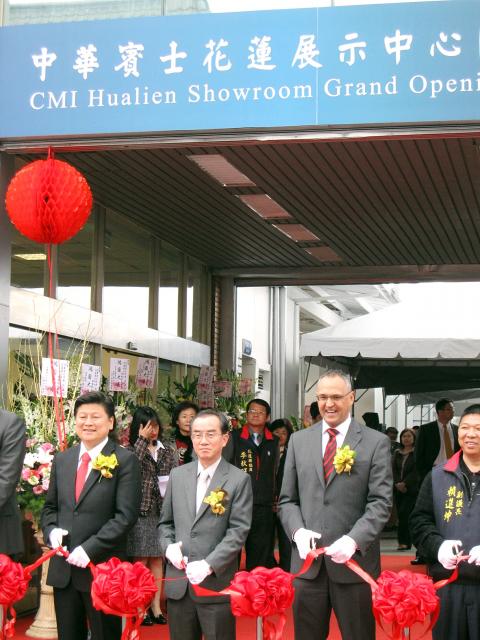Luxury goods makers, including those in the home furnishings and auto businesses, yesterday said the proposed luxury tax “would not have much impact” on sales because their customers are seeking top-quality goods and could afford to pay a little extra.
That contradicts concerns raised by the European Chamber of Commerce Taipei (ECCT) that the tax could hurt car sales.
“Some clients are spending as much as NT$10 million [US$300,000] furnishing their homes. They will not frown on the extra tax,” said David Hsu (徐培庭), marketing director at New World Design Center (紐約家具設計中心).

Photo: Yang Ya-min, Taipei Times
“These customers do not only buy one piece of furniture; they are purchasing many pieces at the same time. That comes out at many zeros [in dollar terms],” he said by phone.
New World Design promotes itself as an operator of top-class furniture malls.
In December, the firm launched a new five-story mall in Neihu, Taipei, that spans 7,000 ping (23,100m2). That complements its three other malls — two in Sinchuang, New Taipei City (新北市), and another in Taichung.
The Neihu mall’s goal is to earn NT$1.4 billion in sales for the first year and that remains intact, Hsu added.
The Ministry of Finance has announced plans to impose a 10 percent luxury tax on the sale of certain expensive goods and services — such as home furnishings that cost NT$500,000 or more, as well as private jets, yachts and cars with a price tag of at least NT$3 million — starting in July at the earliest.
On Wednesday, the ECCT expressed concern over the imposition of a luxury tax on European vehicle importers during an hour-long meeting with Minister of Finance Lee Sush-der (李述德), Central News Agency (CNA) reported, citing ECCT chief executive Freddie Hoeglund and chairman Chris James.
CNA quoted an official at the ministry saying that 3,500 such vehicles were purchased last year and if the tax were imposed, the nation’s tax revenues would be boosted by an additional NT$1.5 billion.
However, the impact could be wider than the ministry’s estimates.
Automakers said that among the 32,000 high-end imported vehicles sold last year, 40 percent — or 13,000 units — were priced at NT$3 million or more.
Mercedes-Benz and BMW would take the biggest hit, said an official from Hotai Motor Co (和泰汽車) who wished to remain anonymous.
Hotai distributes the high-end Lexus models and it sold more than 6,000 cars last year, 500 of them from the LS series — the only model that carries a price tag of more than NT$3 million.
“The impact isn’t that huge to us, but consumer confidence will take a hit. They will wonder why on earth they have to shoulder the extra 10 percent,” he said.

In Italy’s storied gold-making hubs, jewelers are reworking their designs to trim gold content as they race to blunt the effect of record prices and appeal to shoppers watching their budgets. Gold prices hit a record high on Thursday, surging near US$5,600 an ounce, more than double a year ago as geopolitical concerns and jitters over trade pushed investors toward the safe-haven asset. The rally is putting undue pressure on small artisans as they face mounting demands from customers, including international brands, to produce cheaper items, from signature pieces to wedding rings, according to interviews with four independent jewelers in Italy’s main

Japanese Prime Minister Sanae Takaichi has talked up the benefits of a weaker yen in a campaign speech, adopting a tone at odds with her finance ministry, which has refused to rule out any options to counter excessive foreign exchange volatility. Takaichi later softened her stance, saying she did not have a preference for the yen’s direction. “People say the weak yen is bad right now, but for export industries, it’s a major opportunity,” Takaichi said on Saturday at a rally for Liberal Democratic Party candidate Daishiro Yamagiwa in Kanagawa Prefecture ahead of a snap election on Sunday. “Whether it’s selling food or

CONCERNS: Tech companies investing in AI businesses that purchase their products have raised questions among investors that they are artificially propping up demand Nvidia Corp chief executive officer Jensen Huang (黃仁勳) on Saturday said that the company would be participating in OpenAI’s latest funding round, describing it as potentially “the largest investment we’ve ever made.” “We will invest a great deal of money,” Huang told reporters while visiting Taipei. “I believe in OpenAI. The work that they do is incredible. They’re one of the most consequential companies of our time.” Huang did not say exactly how much Nvidia might contribute, but described the investment as “huge.” “Let Sam announce how much he’s going to raise — it’s for him to decide,” Huang said, referring to OpenAI

The global server market is expected to grow 12.8 percent annually this year, with artificial intelligence (AI) servers projected to account for 16.5 percent, driven by continued investment in AI infrastructure by major cloud service providers (CSPs), market researcher TrendForce Corp (集邦科技) said yesterday. Global AI server shipments this year are expected to increase 28 percent year-on-year to more than 2.7 million units, driven by sustained demand from CSPs and government sovereign cloud projects, TrendForce analyst Frank Kung (龔明德) told the Taipei Times. Demand for GPU-based AI servers, including Nvidia Corp’s GB and Vera Rubin rack systems, is expected to remain high,